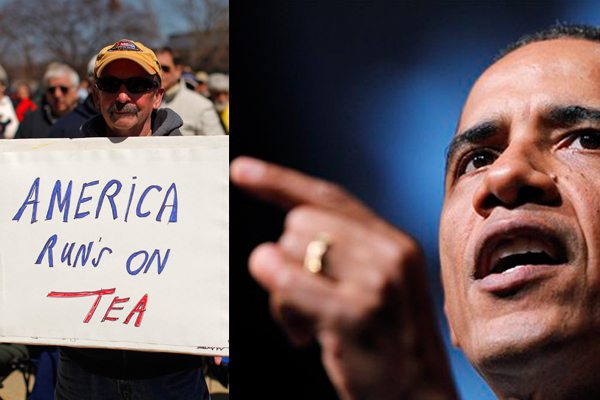The timing was coincidental, but there’s a strong relationship between a speech that Barack Obama delivered in California last night and a new profile of Fox News chief Roger Ailes that went online around the same time.
The theme of the profile, which was written by the Daily Beast’s Howard Kurtz, is that Ailes is making a concerted effort to push his cable channel away from the far-right fringe and closer to the mainstream — a “course correction,” is how Ailes explained it to Kurtz. And if you’re wondering why Ailes, a veteran Republican operative, might be worried about the tone that Fox is setting, Obama provided the answer in his speech at a Sunday night fundraiser:
“Some of you here may be folks who actually used to be Republicans but are puzzled by what’s happened to that party, are puzzled by what’s happening to that party. I mean, has anybody been watching the debates lately? You’ve got a governor whose state is on fire denying climate change. It’s true. You’ve got audiences cheering at the prospect of somebody dying because they don’t have health care and booing a service member in Iraq because they’re gay.
“That’s not reflective of who we are. This is a choice about the fundamental direction of our country. 2008 was an important direction. 2012 is a more important election.”
You can expect to hear a lot more of this from Obama and other Democrats between now and the 2012 election. With the economy unlikely to improve substantially in the next year, his best — and maybe only — route to a second term depends on persuading swing voters that, as frustrated as they are with him, the opposition party has simply gone off the deep end and is in no position to run the country.
That this is a potentially viable strategy for Obama is a testament to what Ailes and his network have done to the GOP since the last election. It was Fox News, after all, that embraced the instant backlash that Obama’s win generated among the base of the Republican Party — a backlash that later became known as the Tea Party movement. As we now know, those who identify with the Tea Party voted for John McCain by an overwhelming margin in 2008. Functionally, they are Republican voters, and their angry, often hysterical and irrational response to Obama’s election was typical for the GOP base — as Bill Clinton can attest.
But Fox, which didn’t yet exist during Clinton’s first term, chose to celebrate the backlash, and in so doing has helped to define the Obama era Republican Party by it. This has meant that even Republicans who don’t necessarily relate to the Tea Party and its knee-jerk Obama rejectionism have felt compelled to pay lip service to it, lest they fall victim to a primary challenge. It’s why the GOP House brought the country to the brink of a government shutdown back in the spring and to the brink of a debt default over the summer — and why the shutdown talk is back again this week. And it’s why the GOP’s official platform next summer will probably be as far to the right as it’s ever been, no matter if Mitt Romney or Rick Perry or anyone else is the nominee. (It also has also arguably produced a climate that encourages the audience outbursts that have marred three consecutive GOP presidential debates.)
Granted, the Tea Party wasn’t much of a liability to the GOP in the 2010 midterms, although primary victories by several of the movement’s more eccentric characters may have cost the party a shot at control of the Senate. But for swing voters in ’10, the GOP existed almost purely as a protest vehicle. Democrats controlled the White House and both legislative chambers and the economy was in the pits; the average swing voter was mainly in the mood to send Obama and his party a message — not to scrutinize the GOP.
Things are a little different now. The showdowns that the GOP House has forced have seriously hurt the party’s image, which is now at its worst level since the Clinton impeachment saga in 1998. And the public’s view of the Tea Party has soured dramatically. Obama isn’t that popular right now — but the opposition party’s numbers are even worse.
This makes it at least plausible that speeches like the one Obama delivered in California Sunday night will find a receptive audience among swing voters as the ’12 campaign heats up. Toward the end of his remarks, the president presented himself as a voice for “fact-based” America. If he can build a winning campaign around this kind of contrast, Republicans like Roger Ailes will only have themselves to blame.

